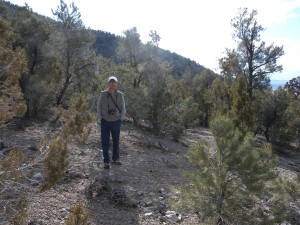
Ever misplace something important, and know exactly where it is, but are unable to access it? A similar circumstance happened to my friend Xiaochun Wang during his time in the DendroLab as a visiting scholar. Xiaochun came to Nevada from the Northeast Forestry University in Harbin, China. His stay in Nevada lasted about a year, and among other activities he was able to come out in the field with me a few times. We had plenty of interesting talks about trees, science, and culture, and as his English was reasonable and my Chinese (any variety) was nonexistent, these exchanges only took place in my native tongue, not his. This sometimes led to crossed wires, but we would figure it out in the end.
A few things were revealed about northern Chinese culture that otherwise I would have remained ignorant of. Of particular amusement to me was Xiaochun’s affinity for hot water as a standard drink. Not tea, mind you: so much for that stereotype. Some cultures are into fizzy water, some into ice water, but to my mind, hot water makes the most sense. If you live north of the 45-degree parallel, you come to appreciate hot liquids. Plus, it simply goes down easier. Pretty soon I was ordering hot water for him at our restaurant stops, and making sure that I had it ready on the campstove. I still have the occasional straight hot water just to remember Xiaochun.
It was the fall when Xiaochun arrived to begin his stay, and he immediately asked about field trip opportunities. I was happy to oblige; in fact, I was going on a trip to some mountains near Las Vegas to continue work on new climate monitoring stations that we were building. He excitedly acquired additional camping/traveling gear, and we headed out. Up until that point, Xiaochun had only been to San Fransisco, over the Sierra, and around Reno, so this trip was going to really expand his experience of the western U.S.
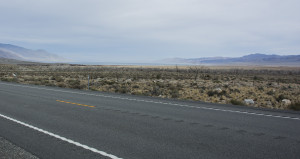
We loaded up the field truck and drove south on U.S. 95 through Fallon, past Walker Lake, and into Hawthorne. I explained to Xiaochun that this was the country I grew up in, and took great pleasure in pointing out every little landmark like a tourist guide. I think Xiaochun was amused in turn with our desert villages and also our concept of history. Nearly all of written societal record in this region has occurred within the previous 150 years (although, not everything). There was one little-known feature of the landscape that I remembered just in time – an historical Chinese grave marker placed near the highway, presumably dating from the construction of the now-extinct Carson & Colorado Railway in which Chinese workers had played the large part.
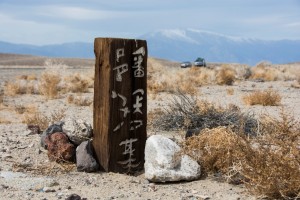
I figured that Xiaochun would appreciate seeing some reference to his part of the world out in the middle of nowhere, so I kept an eye out for the marker as we drove along. Sure enough, on the highway between Hawthorne and Luning I caught sight of it. I pulled the truck to the side and we hopped out. The chilly wind reminded us that Old Man Winter was a force to be reckoned with in the high desert, so we didn’t stay too long. We ran across the highway to the grave marker (a replica, the original is in the Mineral County Museum), and examined the site. Xiaochun took a few photos and marveled at the loneliness of the spot. Despite the nearby highway, that part of the state is really quite desolate.
Jumping back in the truck, we continued on our adventure through more of the southern Great Basin desert and into the Mojave. It was later in the day and we were almost to our destination when Xiaochun let out an exclamation of dismay.
“Oh no! My card! My card is gone!”
“Your card?” I replied, “Which card?”
“My camera card! It’s not here!” Xiaochun seemed truly distressed. “It has all of my pictures of America so far. San Fransisco, the mountains. Oh no!”
“OK, when did you last see it?” This seemed to me like an exercise in finding one’s keys or glasses.
“When we stopped, I changed cards. I was going to send pictures to my family!” Knowing how much Xiaochun missed his young family, I could understand his level of disappointment. I was surprised at his emotion, actually.
“Wait a minute, Xiaochun. You say you dropped it back at the gravesite? No problem, we’ll get it on the way back. Just don’t let me forget.” I’m notorious for forgetting details, even when someone sends me an email reminder. There was no doubt in my mind that we’d recover the card – unless a tarantula or woodrat walked off with it (unlikely, especially in late winter).
It was like somebody had thrown a switch.
“I will never see it again. It is OK, let’s not speak of it.” Xiaochun had decided his fate and accepted it.
“Oh you wait and see my friend, it will be there.” I grinned. This would be an interesting exercise, as Secure Digital flash memory is definitely not a large form factor, although is has quite a reputation for reliability. I was very curious to see if it would survive a few days in the open desert. As for somebody else finding it, that was unlikely in the extreme.
Now it was Xiaochun’s turn to smile.
“It is gone, that is life. I will take more photos.” He clearly thought that I was quite naïve to expect recovery of such a small object from the harsh and unforgiving desert.
“I have faith in flash memory, amigo. However, I will let the matter drop for your sake.” I made an extra metal note to stop and recover the card on the drive home.
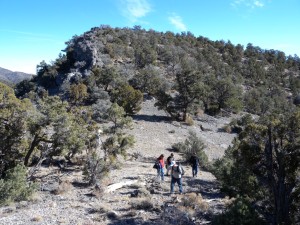
The trip went well, and Xiaochun’s first experience camping in the cold deserts of North America was memorable. We had chilly nights below freezing, but beautifully sunny, cool days. I got plenty of work done while Xiaochun wandered about the lower montane woodlands examining the flora. We wrapped the tasks up and started for home. We stopped in Beatty, Nevada for the excellent home-baked sandwiches at KC’s Outpost, where we caught up on the current weather forecast. I was concerned to hear that a fresh low-pressure system was moving through the area, bringing a trail of moist cold air with it.
“Great. It sounds like we’ll hit some weather on the way home. A classic Tonopah Low will certainly bring snow and ice to the desert passes.” I’ve taken Highway 95 a few times in snowstorms, and while it’s never entertaining, it certainly brings a whole new level of focus to a normally monotonous drive.
Sure enough, it began to snow as we passed through Tonopah. Precipitation intensified as we negotiated the normally insignificant passes on the way back towards Hawthorne. As we once again drove through Mina and Luning, my worst fears were realized.
“Xiaochun, I am sorry to have to say this, but we’re out of luck, old man. There’s at least five centimeters of snow on the ground and counting. We’ll never find your card in these conditions.” I was tremendously disappointed that my experiment was going to fail.
A shocked, surprised look from the passenger seat followed.
“What? Ah ha ha ha ha! You are funny. We were not going to find it, it is gone!” Apparently he really had forgotten all about it.
“Yes, you are right this time. We cannot hope to find it.” I looked bitterly out the window at the falling snow as we drove past the precise spot.
“It’s right there, and yet we cannot reach it. But, perhaps…….” Given Xiaochun’s dogged resignation, I decided to not reveal my plan at pursuing the experiment, albeit at a much longer timescale than intended, and with a suitably lower probability of a positive outcome.
We made it back to Reno without major incident, and went back to life in the laboratory as normal. Xiaochun went on several other local adventures, and even took the opportunity to travel around the country some. His year as a visiting scholar proceeded on until the following springtime, as time came once again for me to head down to the Sheep Range.
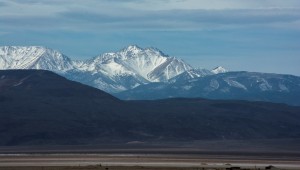
I offered the opportunity to ride along again, which he immediately accepted. I had gotten the feeling that Xiaochun really enjoyed the fieldwork trips into the Great Basin. Once again, we loaded up the truck and headed out. I said nothing of my plan to execute an exhaustive search for his card left months ago in the desert.
As before, the lost card had evidently been completely removed from Xiaochun’s active memory. Until I put the blinker on and eased the truck to the roadside just as I had months previous, he showed no sign of remembering the loss.
“Wait. What are you doing? No, no no no. Ha ha ha! You will not find it. It is gone!” He was really bemused by my persistence, and also by the fact that I had remembered.
“Come on, Xiaochun,” I stated firmly, “Put on your best glasses and get out. The desert will give up her secrets if we look. It is there, trust me.” I really didn’t want to think of the probabilities of wind blowing the card away or sand shifting over the top to hide it from us. Certainly all record of our previous footprints would be removed after the winter snow and rain.
“Now, I will search here, where we parked before. You will go over where you went the last time and look carefully. Try to go to the same places you went before.” I started a methodical transect search along the roadside while Xiaochun acquiesced to my somewhat optimistic wishes and began toeing the dirt as he went along. I found nothing, and had started canvassing my zone for the third time with mounting disappointment when a whoop sounded from across the highway.
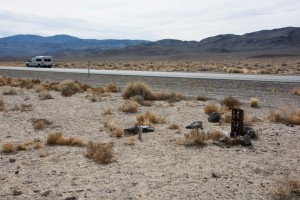
“I found it! I found it!” There was Xiaochun, waving his hand excitedly. I hurried across.
“You have got to be kidding! Where was it?”
“It was right here,” he pointed to the sand. “Just the corner was buried, it might still work!” He blew it off and hastily popped it into his camera, hitting the play button. With no hesitation, photographs taken the previous year appeared on the tiny screen.
“It works! Yes! Amazing!” Xiaochun fairly skipped back to the truck as I stalked along with a certain smug (and relieved) satisfaction.
“Now do you believe me, amigo?” I asked, as if I had never doubted once.
“Of course,” he grinned, “all of my pictures are back. This is just amazing!” Sure enough, not a one had been corrupted or lost. The SD card had proven it’s resilience to the best that a desert winter could throw at it.
“Now what are you going to do, now that you’ve tested America’s Great Basin?” I asked.
“Copy these files onto my computer immediately!” was the reply.
Did you like this tale of fieldwork lost & found? Tweet this story with the #fieldwork hashtag!
